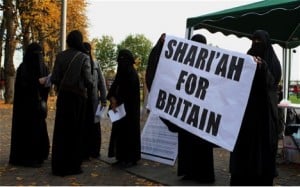Dr. Sherene Razack has a theory called Interlocking Systems of Domination, which says that people can be oppressed in different ways and in interlocking and interconnected ways. The various ways in which people are oppressed cannot be detangled from each other and therefore, the oppression that we face must be examined as a whole, as opposed to broken down by demographics. This has been proposed in contrast to the traditional belief that people with various oppressions experience additive oppressions. That is, for example, that a Muslim lesbian or colour would not be thrice oppressed (religion then sexual orientation then race) but rather her oppression must be examined as coming from her being a woman who is a religious, sexual and ethnic minority at the same time.*

The recent case of Mona Awad demonstrates Razack’s theory. Racism, sexism, and Islamophobia worked together to oppress and victimize a young Muslim woman in the U.K. Awad, bank manger with the Halifax Bank of Scotland, has recently launched a sex discrimination claim against the bank. “Mrs Awad is suing the bank, Mr Harrison and Mr Holland [her bosses] at Nottingham Employment Tribunal for sex, race and religious discrimination.” According to various news sites, Awad experienced sexual and racial harassment at one branch, and due to her complaints, was moved to another branch, where she also experienced sexual and racial harassment. This is what she experienced:
” ‘humiliating’ her in front of her peers by asking ‘whether I was ‘shagging’ an employee of our customer.’ ”
“the former directors at the firm’s offices in Nottingham lifted up her trouser leg in front of other staff, to demonstrate what he would view as being indecent”
“made comments about a colleague wanting to sit on her lap”
“accused one of the former bosses of asking her if she could ‘handle two men’ ”
“a colleague had been watching her in her bikini when on holiday”
Additionally,
“Awad is complaining against one of the former bosses for his alleged treatment of her during the festival of Ramadan in 2007. She claimed that her request for flexible hours was ignored and that she was repeatedly told that it was ridiculous that she was unable to eat during the fasting period.”
“a third senior colleague asked her at a Christmas party whether she was an ‘active Muslim’. When she asked what he meant, he allegedly replied ‘Do you carry bombs on trains?’ ”
“the former manager said, ‘he did not wish to work with Asians’ – and said he assumed because she was Muslim she must be ‘an Asian’ “
(Just for clarification, Awad is of Egyptian origin – not South Asian.)
The sexual harassment Awad faced was done within the context of her religion and ethnic minority status. Awad having her pant leg lifted was an Islamophobic form of sexual harassment. Her boss not only violated her sexually but he based that violation on what he thought were Islamic codes of modesty and thus ridiculed her religion while sexually harassing her. The sexual harassment, combined with the Islamophobia demonstrated through a prohibition of flexible hours during Ramadan (among other incidences), and blatant racism of disliking Asians (although not her ethnicity) demonstrates how her employers thought of her as inferior not just based on her gender, but a combination of her being a Muslim woman of colour. Although her employers sexually harassed other women as well, the harassment she was subjected to targeted her religious and ethnic status along with her gender. The harassment she faced must be understood within the context of her being a Muslim woman of colour and not just on her being a woman.
* To read more on the topic read Looking White People in the Eye: Gender, Race, and Culture in Courtrooms and Classrooms











